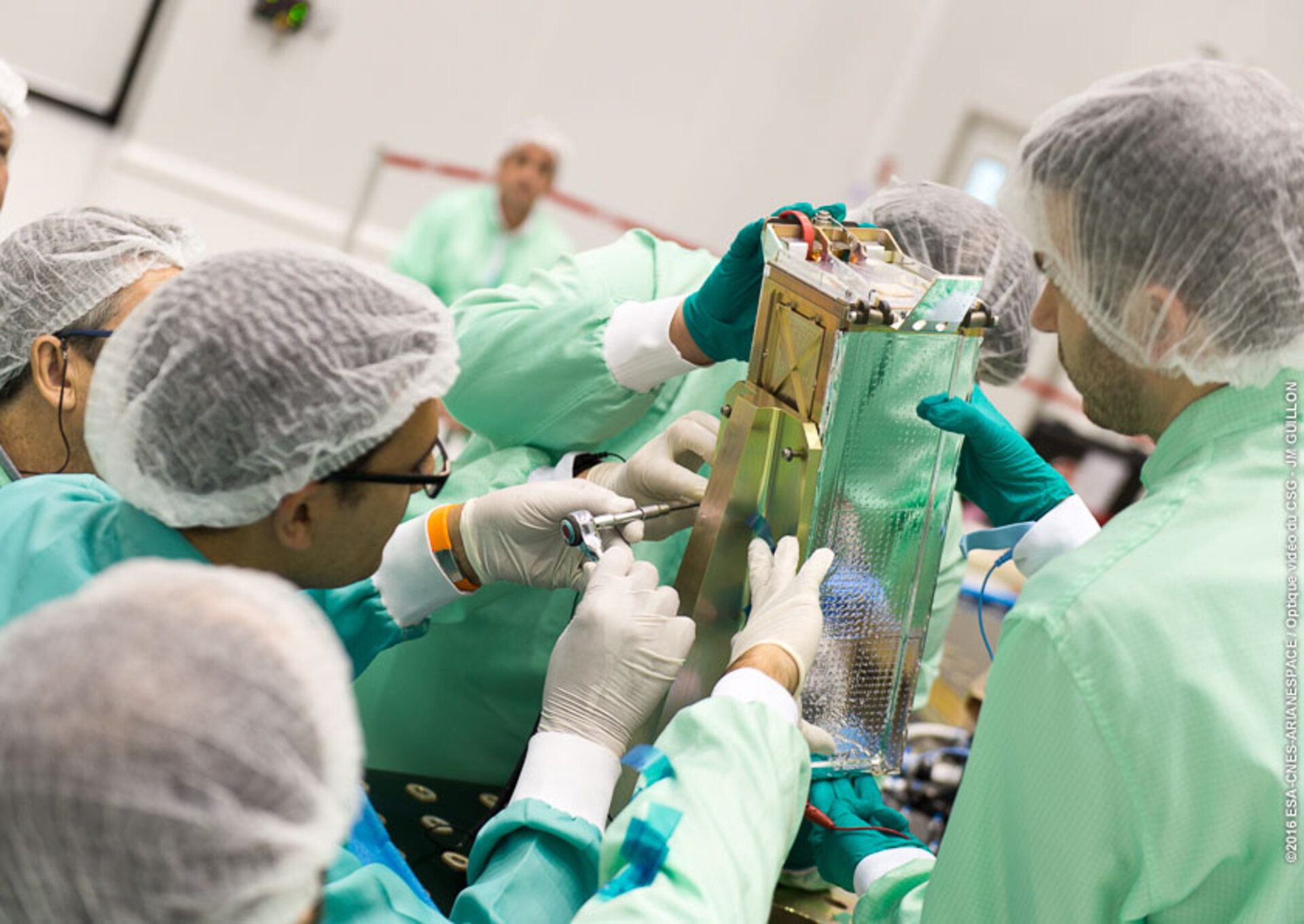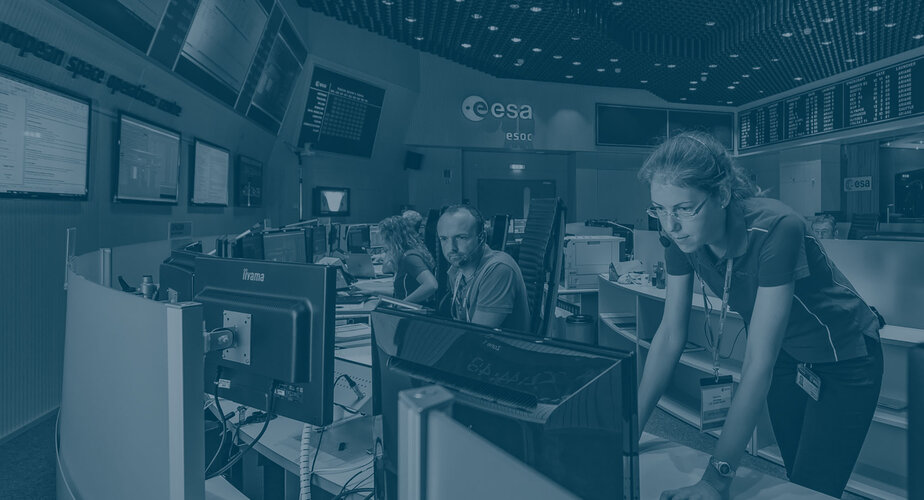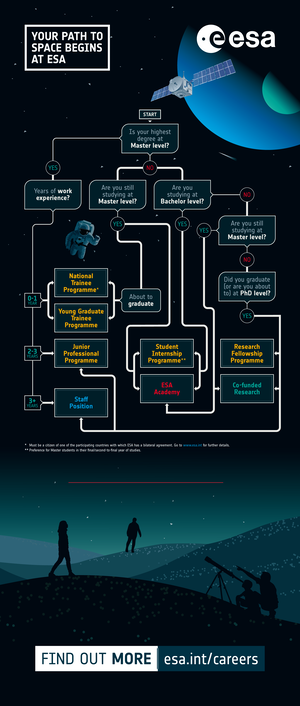Student Internships
ESA offers student internship opportunities from three to six months to students in their final or second-to-last year of a Master's degree in technical and non-technical domains. Learn everything you need to know in this article.

Who can apply?
To be eligible for a student internship at ESA:
- You must be a student, preferably in your final or second-to-last year of a university course at Master’s level. You must have student status and be enrolled at university for the entire duration of the internship.
- You must be a citizen of one of the following ESA Member States: Austria, Belgium, Czechia, Denmark, Estonia, Finland, France, Germany, Greece, Hungary, Ireland, Italy, Luxembourg, the Netherlands, Norway, Poland, Portugal, Romania, Spain, Sweden, Switzerland, and the United Kingdom. Nationals from Latvia, Lithuania, Slovakia and Slovenia, as Associate Members, or Canada as a Cooperating State, can apply as well as those from Bulgaria and Cyprus as European Cooperating States.
What do we offer?
- An enriching and highly valuable experience that could open doors to a career within Europe’s space sector, renowned research institutes or, of course, ESA itself.
- An international, multicultural and friendly working environment.
- A placement lasting between three and six months at an ESA establishment.
- Internships are unpaid, however a monthly allowance of €800 for non-residents and €500 for residents is granted. A non-resident is defined as someone living more than 50 km from the relevant establishment. The non-resident allowance will also be granted to students with special needs, irrespective of their residency status.
Useful information
- Students usually complete one internship placement during their studies. This may, exceptionally, be split into two parts if requested by the student’s university, provided that the total duration does not exceed six months.
- Student interns are responsible for their own health insurance, accident insurance and travel expenses.
- Student interns are responsible for finding their own accommodation.
Internship disciplines
- Mechanical engineering (optical, propulsion, thermal, mechanisms, structures, materials, robotics)
- Electrical engineering (RF, power & data systems, antennas, microelectronics, EMC, components)
- System engineering
- Telecom and integrated applications
- Software engineering
- Ground segment systems and operations
- Product/quality assurance and safety
- Applied mathematics
- Earth observation and environmental science (geophysics, meteorology, climatology)
- Planetary and space science (astronomy, astrophysics, solar physics)
- Life and material sciences
- Law (contracts, procurement, international public law)
- Finance (project control, cost analysis, auditing)
- Communications and public relations
- Human resources
- Information technology
- Facility management

More about life at ESA
Find out everything you need to know about life at ESA and work-life balance on our pages.
For more information about ESA sites, check out ESA Establishments.
Recruitment process
How to apply for a student internship opportunity
Opportunities are published in November each year and remain open for a month. You can set up a job alert to be informed as soon as the opportunities are published!
- Once published, you will be able to browse the ESA list of opportunities here.
- Select the opportunity that most interests you and fits best with your academic background and aspirations. Due to the high number of applications received each year, we can only accept a maximum of two applications per person (Please note: there is no limit in the choice of topics within one opportunity). Should you apply to more vacancies in this call, all your applications will be disregarded. If your profile is well-suited to another position, we will share it with the hiring manager.
- To apply, you first need to register and create your candidate profile with your CV and motivation letter.
- Once you have applied, you will be able to track the status of your application.
Recruitment timeline
- November: call for applications
- December - February: shortlisting and selection of candidates
- February: earliest start date for internships. The start date is set by mutual agreement between ESA and the university and takes into account the preferences stated in your application form. In principle, you can start at any time between February and October of the same year.
All candidates will be informed of the outcome of their application.
Our tips for your application
Before applying, read the details of each position thoroughly and focus your attention on the one that is most in line with your interests and background.
Share your motivation, interests and enthusiasm in your motivation letter – but keep it clear and concise! Answer the questions in the application form carefully: they are important for us to learn more about your profile.
If you have any further questions, feel free to write to us at contact.human.resources@esa.int.
Looking for more learning and hands-on opportunities?
ESA Academy is open to university students from undergraduate to PhD level coming from ESA Member States, Canada, Latvia, Lithuania, Slovakia and Slovenia.
ESA Academy teams up with European universities, space institutes, and national space agencies to offer exceptional learning opportunities and practical experiences in a vast portfolio of programmes. ESA Academy is designed to complement academic education. Its objective is to enhance students’ educational experience and help them develop both practical and theoretical know-how and expertise in various disciplines, ranging from space sciences to engineering, space medicine, spacecraft operations, project and risk management, product and quality assurance, standardisation and much more.
Learn more about ESA Academy.
Find your path at ESA
ESA offers a number of entry-level programmes targeting students (Master or PhD), recent graduates and young professionals, alongside its vacancies for experienced professionals. One of them could be your path to space! Quickly find out which programme could be the best fit for you by following the pathways at ESA on our entry-level flowchart.












